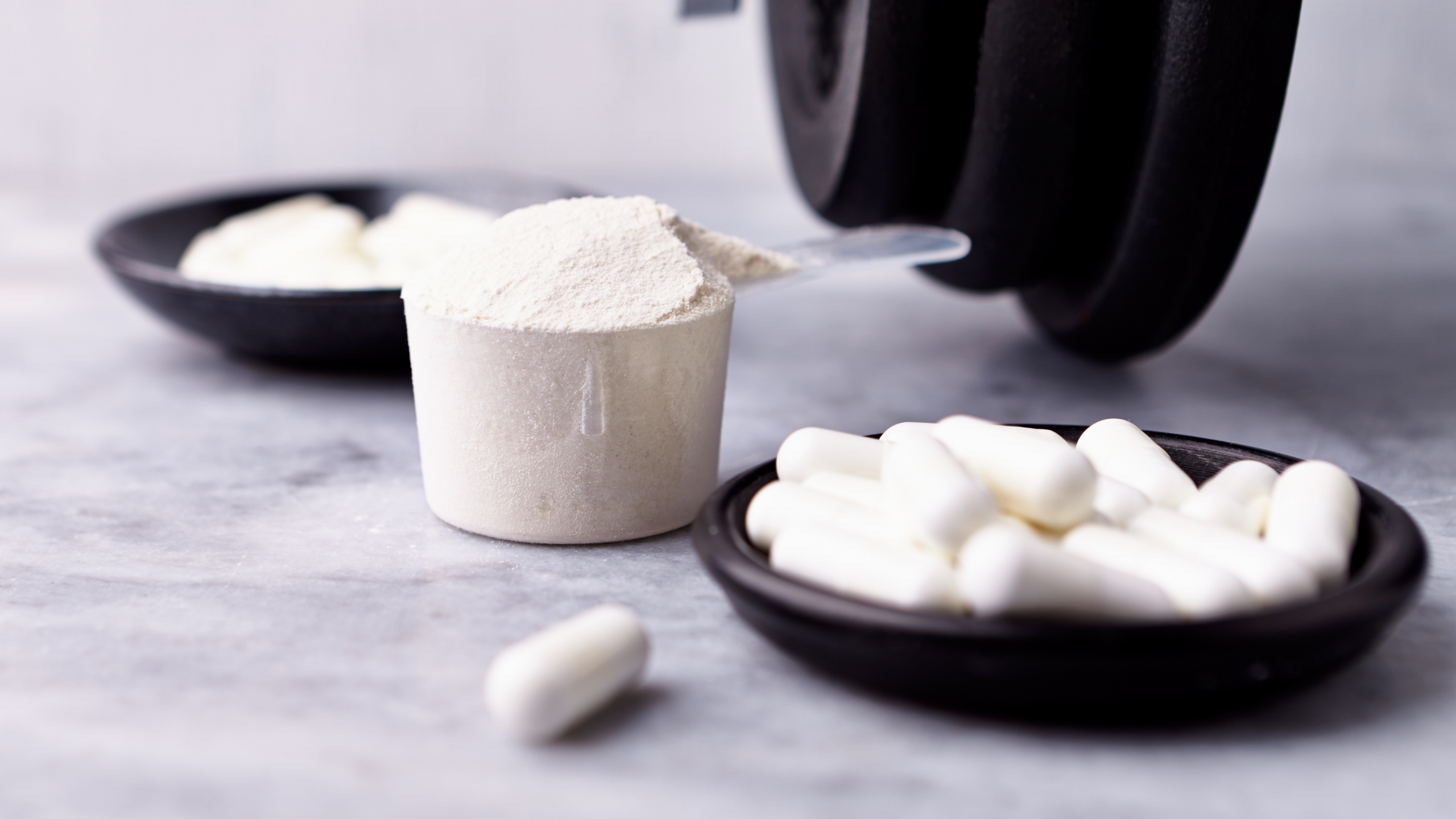If you’re an athlete looking to enhance your strength, chances are you’ve seen creatine supplements sitting on the shelves at your gym or local health food store. This supplement has become a staple in the fitness community as it is suggested to help you increase muscle mass, endurance, and overall performance. But, should you mix it with protein powder to add even more fuel to your gains? Before answering that question, let’s first understand what creatine is, how much you should take, and the health benefits surrounding it.
What is creatine?
Creatine is a compound formed of amino acids (such as L-arginine, glycine, and L-methionine), naturally found in muscle cells. It supplies energy to your muscles to aid with growth, strength and performance [1]. The majority of creatine in the body is stored in muscles in the form of phosphocreatine, and the remainder is found in your brain, liver, and kidneys [15].
Dietary recommendations
Research has found that your body needs between 1-3 g/day to maintain normal stores of creatine, but athletes may need to consume between 5 and 10 g/day to maintain optimal capacity of their stores [2].
Studies have also suggested that consuming 0.3 g/kg of body weight/day can be effective in increasing muscle creatine stores. However, this can vary depending on your existing muscle mass, since the more muscle you have, the more creatine is stored [2,5].

Are creatine supplements right for you?
You can get all the creatine you need from what your body naturally produces, as well as through some key dietary sources (such as fish, meat and other animal products). However, if you lift extremely heavy weights, participate in high-intensity workouts, or eat a plant-based diet, you may want to consider a creatine supplement [4].
Research shows that excess creatine consumption (more than 20 g/day for over 5 days) can cause bloating and mild GI discomfort, so it’s recommended to talk with your healthcare provider to see if supplementation is right for you [6].
Health benefits of creatine
Creatine has been shown to boast a variety of health benefits, including:
Improved brain function. Research suggests that short term creatine supplementation of 20 g/day could have a positive impact on short-term memory, reaction time, and mental fatigue [7].
Increased muscle mass. Studies have shown that when creatine is taken in combination with weight lifting, people gained an extra 3 pounds of lean muscle mass compared to those who only weight trained without supplementation [3,8,9].
Glucose management. When combined with exercise, creatine has been found to improve glucose metabolism in insulin-resistant individuals [10].
Enhanced athletic performance. Creatine allows your body to produce more energy, which is why athletes commonly turn to creatine supplements to help increase strength, power, and overall athletic performance [2].

Can you mix creatine with protein powder?
Since creatine and whey protein both increase muscle mass, athletes tend to take them in conjunction in hopes of taking their fitness gains to the next level. But what does the science have to say about mixing creatine with protein powder?
The results are a bit varied. Some research suggests that when taken in combination with resistance exercise, creatine and whey protein powder can increase creatine retention, increase muscle mass and boost performance [2]. However, other studies have found that people who took both whey protein and creatine did not experience any additional training benefits, and saw no difference in muscle mass and strength compared to taking either one on its own [11,12,13].
Despite some mixed results, research seems to suggest that there are not many additional benefits to mixing creatine with whey protein powder, as both are effective enough on their own. However, you may decide to take them together for the sake of convenience [14].
Protein recommendations
Eating enough protein for your goals may decrease reliance on supplements. How much protein you need varies with age and can increase significantly with physical activity, injury, or illness. The Dietary Reference Intake (DRI) for protein for adults is as follows:
Men and women: 0.8 g protein/kg of body weight/day [16]
Over 65 years old: 1 to 1.2 g protein/kg of body weight/day [17]
Protein recommendations for athletes and highly active men and women range from 1.2-2.0 g/kg of body weight/day, depending on training needs and goals [18,19,20]. Of course, these numbers will vary depending on your activity level, age, and other needs, so talk with a dietitian or your healthcare provider to see what is right for you.
Introducing Elo Smart Recovery
Elo Smart Recovery is the world’s most personalized recovery product, offering a combination of high-quality protein, functional nutrient boosts such as super greens and turmeric, and real-time dosing recommendations tailored to your needs and workout. Your unique Smart Recovery blend is determined using a combination of data from wearables and activity apps, dietary preferences, and goals. Your information is then matched with the latest scientific research to determine a blend of ingredients that both maximizes post-workout recovery and supports your health goals. Learn more about how it can enhance your recovery.
Summary
Creatine has a wide array of health benefits (including improved brain function and glucose management), but it is most widely known in the fitness community for its positive impact on energy, muscle mass, strength, and recovery time. As such, athletes tend to take creatine in conjunction with whey protein powder with goals of taking their fitness gains to the next level. However, while results are a bit varied, studies have found no additional benefits to mixing creatine with whey protein powder, since both are effective on their own.
Disclaimer: The text, images, videos, and other media on this page are provided for informational purposes only and are not intended to treat, diagnose or replace personalized medical care.

Share:
Elo Raises $5 Million in Seed Funding From Pro Athletes And Tech Luminaries to Pioneer A New Category of Smart Nutrition Products
The best forms of protein powder, according to science